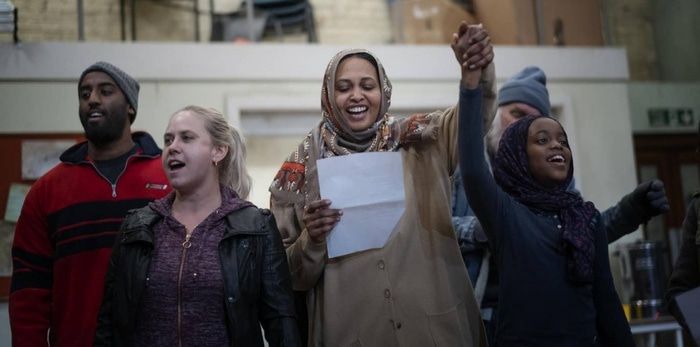Theatre Review | Faith, Hope and Charity: Understated yet devastating account of life on the margins in the age of austerity
by Ruby Fischer
National Theatre
In tune with the times: Faith, Hope and Charity Photo: Sarah Lee
“I don’t want theatre to be comfortable,” writer and director Alexander Zeldin told the Morning Star last week. “I don’t want it to be consensual.” When the lights go up on his latest play, Faith, Hope and Charity, it’s with a stark, fluorescent flicker that transforms the Dorfman into a run-down community centre and food bank on the brink of closure. At its helm is Hazel (played by the brilliant Cecilia Noble), whose weekly patchwork meals struggle to fill the gaps left by a crumbling welfare state in the age of austerity. Nick Holder is full of heart as Mason, the affable ex-con turned volunteer choir-master, whose clumsy platitudes become an essential tonic for the people who find quiet respite beneath the centre’s leaky roof. There’s nothing consensual about the arrangement - Natasha Jenkin’s brilliantly observed, hyperrealistic set enfolds the illuminated audience, and the performers frequently sit among us, indistinguishable but for the price of a front-row seat.
It’s a time-honoured device, but Zeldin’s outstanding cast steers clear of schmaltz, delivering richly textured performances which on Tuesday night found touching expression in an easy improvised exchange between Noble and Holder. The cohesion of the company reflects a conscientious, investigative rehearsal process, with a standout performance by Alan Williams who finds a precise balance between humour and pathos as the elderly Bernard, whose dedication to the choir is matched only by his inability to hold a tune. Susan Lynch brings a poignant urgency with every entrance as Beth, a young mother caught in gruelling court proceedings for custody over her four-year-old daughter, Faith. Bobby Stallwood plays her teenage son whose desperate attempts to absorb his mother’s pain ring with clarity and truth. Dayo Koleosho is delightful and moving as Karl, whose carer never does arrive to collect him.
Zeldin’s work offers neither a solution nor an indictment, much of its two hours and twenty minutes focuses on small but significant acts of care which demonstrate, in their own quiet way, the shape of human resilience in modern Britain; what it means for those living on the frayed edges of a failing system, and yes - their enduring capacity for hope. But it’s a hope that’s wearing thin, as we see in the final beat of the play when a line of whispered song turns into a guttural bellow of anguish and exhaustion. Communities and their problems go on and on, and they aren’t solved, they’re left, on a thought and a prayer, to Faith, Hope, and Charity.
